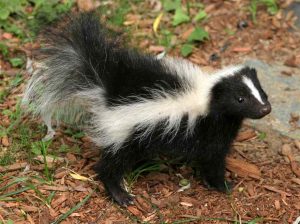Five skunks test positive for rabies in Larimer County
By Shelley Widhalm
The Surveyor
The Larimer Humane Society cautions pet owners to take a few steps to protect their cats and dogs from rabies in response to two confirmed rabid skunks.
The skunks are the first positive rabid animals in Larimer County in 2018, as identified by the Larimer County Department of Health and Environment.
“It’s pretty early. We usually don’t see them start until May or June,” said Katie O’Donnell, public information officer for the Department of Health and Environment. “It’s been warmer weather. … They tend to come up when it’s not as cold.”
The first skunk was found on the south side of Fort Collins on Feb. 2 and identified on Feb. 4. A second rabid skunk was found in Wellington on Feb. 22 and identified the next day. 
In 2017 there were seven bats and one skunk confirmed with rabies — the average is 10 to 15 cases of rabies in a given year.
“Any time we find an animal that tests positive for rabies residents should be on extra alert,” said Kaylene Weingardt, marketing and community outreach manager for the Larimer Humane Society.
Cats, dogs, horses and livestock are all at risk for contracting rabies from an infected animal, such as a bat, raccoon or skunk. The disease is transmitted to animals and humans through a bite, scratch or exposure to its saliva. It is carried by a virus that affects the central nervous system and, if not treated, can result in paralysis and eventually death.
Animals can be protected from the virus through up-to-date vaccinations, particularly those for rabies that are administered every three years, Weingardt said.
Most veterinarians recommend rabies vaccinations start between 12 and 24 weeks of age for the first shot, followed by a booster shot at one to one-and-a-half years.
“We typically tell people as long as their animals are up to date on their rabies shots they should be fine. It’s the unvaccinated animals that aren’t,” O’Donnell said.
Unvaccinated animals that encounter a rabid animal may be required to be quarantined and monitored and have to go through state protocols.
“Other things pet owners should be doing to keep their pets safe from rabies is to keep their cats indoors and their dogs on leash when outside,” Weingardt said. “We encourage pet owners to feed pets indoors and animal-proof their trash to deter rabies vector species from entering their yard or home.”
Rabies vector species are species that could be potential carriers of rabies.
“We want to remind community members to always stay away from wildlife, whether it’s alive or deceased, and always teach children to never touch wild animals,” Weingardt said.
The Larimer Humane Society recommends other precautions, including reporting animals that are acting strangely or sick to Animal Protection & Control, preventing wild animals from getting into the home and licensing all pets.
“As long as we’re keeping our pets vaccinated we all can stay healthy and safe in our community,” Weingardt said.
Humans cannot be vaccinated for rabies, but treatment can be administered post exposure to a bite to prevent contraction of rabies, according to the Department of Health and Environment. There is no post-exposure treatment for animals, and it is always fatal in unvaccinated animals, the department stated on its website at http://www.larimer.org/health/.
Most bats and skunks do not carry rabies — in Larimer County, it is estimated one percent of bats may be infected with rabies and a relatively small number of skunks have rabies at any one time. The bat population increases during migration season from July through early fall, and skunks are more active in spring and summer. Both animals are nocturnal and daytime appearances or sluggish behavior could indicate rabies. Skunks, too, may act frenetic, walk in circles or be unable to keep their balance, another indicator of an infection.
The main carrier of rabies in Colorado before 2007 was bats, but since then skunk rabies spread from eastern Colorado and along the Front Range, resulting in skunks also being a carrier. Skunk rabies cannot be eradicated once it is established in an area and can sometimes spread infections to other wild animals, such as foxes, coyotes, raccoons, mountain lions and bobcats.
“It is pretty serious, and it’s preventable,” O’Donnell said. “Your dogs and cats are protected as long as they are vaccinated. … If they’ve been current on their vaccines, there’s nothing you have to do.”
- July, 25 2019

FoCo Roller Derby offers many options...
By Shelley Widhalm The Surveyor Before joining FoCo Roller Derby, Meagan Brockmeier of Berthoud hadn’t...
- January, 25 2019

Mayor Karspeck discusses current issu...
By Rudy Hemmann The Surveyor Berthoud Mayor Will Karspeck recently sat for an interview and...
- March, 08 2019

County commissioners revamp community...
By Rudy Hemmann The Surveyor Third District County Commissioner Tom Donnelly had only himself to...
- April, 23 2020

High-speed chase through Berthoud end...
By Amber McIver-Traywick The Surveyor Two suspects were arrested after a high-speed pursuit that began...
- April, 20 2018

Good news about your water supply
Special to the Surveyor Strong regional water storage coupled with below-average precipitation prompted the Northern...
- March, 12 2015

Hart due back pay for insurance snafu
By Rudy Hemmann The Surveyor The Berthoud Board of Trustees discussed the structure of the...

Snowpack at 119% above normal
Community News

Karspeck to serve third term as Berthoud mayor
Community News

OPINION – No bitchin’ allowed
Community News
Roy Tripi to become principal of BHS on July 1
Community News
Berthoud Sports Hall of Fame announces 2024 inductees
Community News
Girls helping girls: a compassionate Girl Scout project
Community News
Longview Campus served 1,000-plus since opening
Community News
COMMUNITY CALENDAR:
Community Calendar – add an event
Homestead Fine Art Gallery First Fridays OPEN HOUSE
03 May 4:00 PM - 7:00 PM
Homestead Fine Art Gallery First Fridays OPEN HOUSE
07 Jun 4:00 PM - 7:00 PM
Homestead Fine Art Gallery First Fridays OPEN HOUSE
05 Jul 4:00 PM - 7:00 PM
Homestead Fine Art Gallery First Fridays OPEN HOUSE
02 Aug 4:00 PM - 7:00 PM
Homestead Fine Art Gallery First Fridays OPEN HOUSE
06 Sep 4:00 PM - 7:00 PM
Homestead Fine Art Gallery First Fridays OPEN HOUSE
04 Oct 4:00 PM - 7:00 PM

